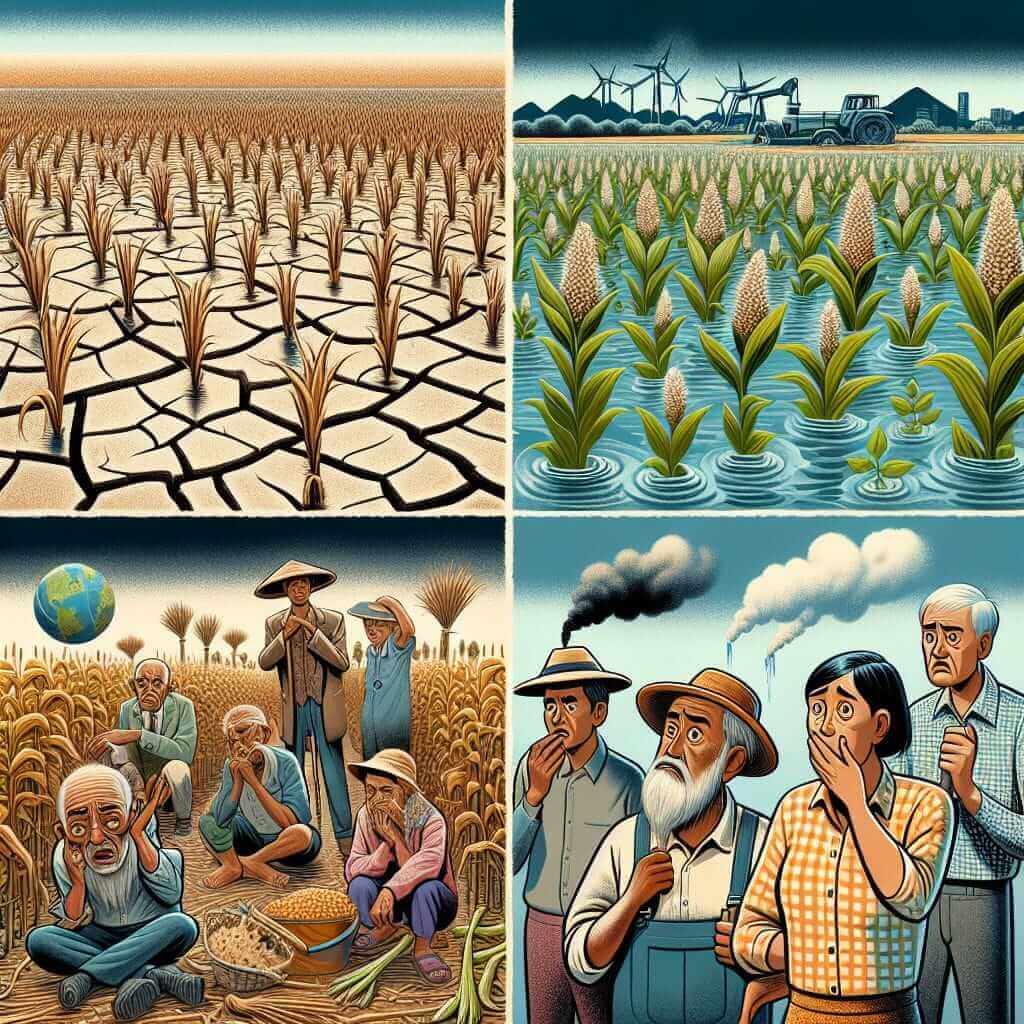Climate change is a prevalent topic in the IELTS Reading exam, reflecting its real-world relevance and the need for test-takers to stay informed on current issues. The implications of climate change on food production is a frequent theme, thus preparing for such topics can significantly enhance your reading skills and exam performance.
The Importance of the Topic
This theme frequently appears due to its global importance and its widespread discussion in scientific and policy-making circles. Understanding the impact of climate change on food production can help you tackle related questions in the IELTS Reading exam, particularly when it comes to recognizing writer’s views and claims, identifying information, and matching headings or features.
Sample Reading Test: Hard Text
Passage: The Implications of Climate Change for Food Production
Climate change poses one of the greatest challenges for global food production in the 21st century. Rising temperatures, shifting precipitation patterns, and an increase in the frequency of extreme weather events are all contributing to reduced agricultural yields. This situation is exacerbated by the growing population, which increases demand for food.
One major impact of climate change on food production is the alteration of growing seasons. As temperatures rise, crops may be forced to mature faster, which can result in lower yields. Moreover, elevated temperatures can increase the prevalence of pests and diseases, further straining agricultural output.
Precipitation patterns are also changing, with some regions experiencing more intense droughts while others suffer from increased flooding. Both of these extremes can devastate crop yields. For instance, droughts can lead to soil degradation and loss of arable land, while floods can destroy crops and wash away topsoil, making it difficult to grow new plants.

Climate change also affects the nutritional value of food. Studies have shown that increased CO2 levels can reduce the concentrations of essential nutrients in staple crops like wheat and rice. This decline in nutritional quality is a significant concern for food security, particularly in developing regions where populations rely heavily on these crops.
In response to these challenges, farmers and scientists are exploring various adaptation strategies. These include developing drought-resistant crop varieties, improving irrigation techniques, and utilizing sustainable farming practices that enhance soil health. Additionally, policy measures that support agricultural research and promote resilience in farming communities are critical.
By understanding these implications, we can better prepare for the future and work towards sustainable solutions that ensure food security amid the changing climate.
Questions
Multiple Choice
-
What is one major impact of climate change on food production?
- A. Increased precipitation
- B. Alteration of growing seasons
- C. Decline in farming equipment
- D. Reduction in population growth
-
What agricultural challenge is associated with elevated temperatures?
- A. Increased soil fertility
- B. Faster crop maturity
- C. Decrease in pest populations
- D. Improved water availability
Identifying Information (True/False/Not Given)
- Climate change is causing a higher annual yield in all agricultural regions.
- Floods caused by changing precipitation patterns can lead to the loss of topsoil.
Matching Sentence Endings
- Studies have shown that increased CO2 levels…
- A. …increase crop yields by 20%
- B. …reduce concentrations of essential nutrients
- C. …have no effect on crops
- D. …only impact tropical regions
Answers and Explanations
-
B. Alteration of growing seasons
- This is explicitly mentioned in the passage as a major impact of climate change on crops.
-
B. Faster crop maturity
- The text states elevated temperatures force crops to mature faster, resulting in lower yields.
-
False
- The text discusses reduced agricultural yields due to climate change, not an increase.
-
True
- The passage notes that floods can destroy crops and wash away topsoil.
-
B. …reduce concentrations of essential nutrients
- The passage indicates that higher CO2 levels lower the nutritional quality of staple crops.
Common Mistakes
One common mistake is failing to identify implicit information. Students often overlook the necessity of inferring information from the passage as opposed to relying strictly on explicit statements.
Vocabulary
-
Precipitation (n) – /ˌprɛsɪˈpeɪʃən/
- The action or process of precipitating a substance from a solution.
- Example: Changes in precipitation patterns can significantly impact agricultural productivity.
-
Arable (adj) – /ˈærəbəl/
- (Of land) used or suitable for growing crops.
- Example: The loss of arable land is a severe consequence of prolonged droughts.
Grammar Points
Conditionals
- Type 1 Conditional (Real condition in the present/future):
- If temperatures rise, crops may be forced to mature faster.
- Formula: If + present simple, will + base verb.
- Example: If farmers adopt sustainable practices, they will improve soil health.
Passive Voice
- Passive Structure:
- Precipitation patterns are also changing, with some regions experiencing more intense droughts.
- Formula: Subject + auxiliary verb (to be) + past participle.
- Example: Essential nutrients in crops are being reduced by increased CO2 levels.
Advice for Improving Reading Scores
- Practice Regularly: Engage in regular reading and practice with a variety of texts to improve speed and comprehension.
- Focus on Keywords: Identify keywords in the questions and locate them in the passage to find answers quickly.
- Enhance Vocabulary: Expand your vocabulary to better understand the passages and questions.
- Time Management: Practice managing your time effectively to complete all questions within the given time frame.
Climate change and its implications for food production is a critical topic in the IELTS Reading test. By understanding the impacts, expanding vocabulary, and honing comprehension skills, you can improve your reading performance and achieve higher scores.